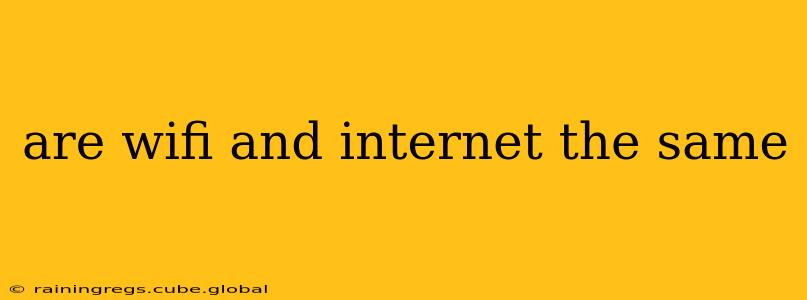The short answer is no, WiFi and the internet are not the same thing. While they're often used interchangeably in casual conversation, they are distinct concepts. Think of it like this: the internet is the vast network of interconnected computers and servers worldwide, while WiFi is a way to access that network.
Let's break down the differences:
What is the Internet?
The internet is a global system of interconnected computer networks. It's a massive network allowing billions of devices to communicate and share information. This information exchange includes emails, web pages, videos, and countless other data types. The internet itself is built on a complex infrastructure of cables, satellites, and routers, working together to deliver data across continents.
What is WiFi?
WiFi (Wireless Fidelity) is a wireless networking technology that allows devices like laptops, smartphones, and tablets to connect to the internet (or a local network) without the need for physical cables. It uses radio waves to transmit data, providing a convenient way to access the internet from various locations within range of a WiFi router. The router itself connects to your internet service provider (ISP), providing the gateway to the broader internet.
How Do They Work Together?
Your WiFi network acts as a bridge between your devices and the internet. When you connect to a WiFi network, your device communicates wirelessly with the router. The router, in turn, is connected to your internet service provider via a cable (usually a fiber optic cable or DSL line). Your ISP then connects you to the vast network that is the internet, allowing you to access websites, stream videos, and perform countless other online activities.
What Happens When My WiFi is Down, But the Internet is Up?
If your WiFi is down, but your internet is up, it simply means your wireless connection to your router is disrupted. However, you can still likely access the internet through a wired connection (by plugging directly into your router with an Ethernet cable). This confirms that the issue lies solely with your WiFi, not your internet connection.
Can I Have Internet Without WiFi?
Absolutely! You can access the internet without WiFi using other technologies, such as:
- Ethernet cables: Directly connecting your device to your router or modem using an Ethernet cable provides a wired internet connection. This is often faster and more stable than WiFi.
- Mobile data: Smartphones and tablets can connect to the internet using cellular data provided by your mobile carrier.
- Satellite internet: Satellite internet uses satellites to provide internet access, particularly in areas with limited or no broadband infrastructure.
In Summary
WiFi is a technology that allows wireless access to the internet. The internet itself is the vast network of interconnected computers and servers. They are distinct, but fundamentally intertwined, concepts. Understanding the difference is key to troubleshooting internet connectivity issues and choosing the best way to access the world wide web.
